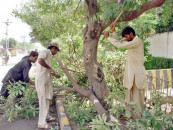Say ‘hello’ to the Great Depression!
We denied importance of tax, power sector reforms for two decades, and now all will come back to bite us in the rear.

Remember the big takeaway line from that fateful 48 hours after Lehman Brothers filed for bankruptcy protection on September 15, 2008? “We may not have an economy on Monday,” warned Ben Bernanke as government leaders met to try and hammer out a bailout for Wall Street after Congress had defeated the first attempt to pass a $700 billion plan.
Well this time it’s bigger and worse. The climax has yet to arrive; we don’t know how far and how deep this thing is going to go.
But we do know this much: the economic event coming our way is unlike anything the world has seen since, at least, 1931, and that’s a very long time ago.
It’s also worth remembering that the Great Depression changed the map of the world. It spelt the death knell for the British Empire, it caused the advanced industrial economies to turn inward, to abandon their commitment to ensuring a disarmed Germany, to adopt a radical new economic philosophy which when put into practice, changed the nature of the modern state.
So it’s not exactly a blip that we’re talking about here, and if there is anything that is driving American priorities in our region, in the war on terror, in Afghanistan, it is the state of their economy at home and not the Machiavellian machinations of our security forces.
With an epoch-making economic event on the horizon, and a historic superpower battle winding down to a nasty close in our neighbourhood, you’d think we’d be a little more humble when regarding our chances of survival in the medium term future.
I’ve written plenty on how it’s a profound folly to cling to the notion that we will be unaffected by the economic crisis developing around the world. We have a way of dealing with things in our culture, and it’s called ‘denial.’ This is how it works: you pursue extremely short-term objectives with a maniacal intensity, for example, cultivating militant extremist groups to use as a tool in a deniably militarised foreign policy towards your neighbours. When confronted with common sense, that these groups will one day escape your own control, you deny that any such thing can ever happen. And you do this for decades.
Then one day the inevitable happens, these groups escape your control, some amongst them pick a fight with the superpower without asking you first, and drag you into a war you never really intended to start. At this point you start playing the victim: ‘We’re the biggest victims of terrorism’ or ‘there were no suicide bombings in Pakistan before 9/11!’. Of course there weren’t! All our suicide bombings were being done in other people’s countries before 9/11.
It’s the same in economic matters too. For instance, we denied the importance of reforms in tax and power sectors for two decades. To meet revenue shortfalls, we relied maniacally on external resources, particularly the IMF, and for the power shortfall, we relied on oil-based power plants that proliferated like mad. Never mind all the warnings that our growing dependence on external largesse, and on imported oil will come back to bite us in the rear one day, deny all that.
Now the inevitable has happened. We’re saddled with power generation capacity that we cannot afford to operate, dependent on foreign inflows that we cannot afford to let go of. These weaknesses in our economy — which matter a great deal when you live through 12 hours of loadshedding — are the wobbly legs that we’re standing on as the winds of a historic storm begin to blow. This is where denial has brought us: to the inevitable moment of truth. Denial will not get us out though, unfortunately, she’s a fickle companion on this road.
Published in The Express Tribune, September 29th, 2011.


















COMMENTS
Comments are moderated and generally will be posted if they are on-topic and not abusive.
For more information, please see our Comments FAQ